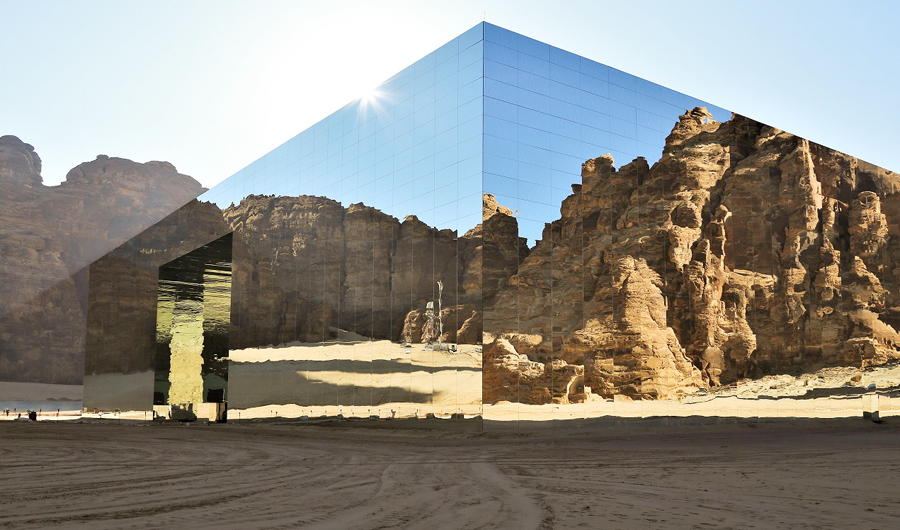RIYADH: The magnificent Maraya Concert Hall in the northwestern Saudi province of AlUla has set a Guinness record for the largest mirrored building in the world.
Maraya (meaning mirrors in Arabic) has been dubbed the “mirrored wonder” due to the giant sheets of glass attached to its structure, which reflect AlUla’s breathtaking landscape.
This includes Hegra, the first historical site in Saudi Arabia to be included on the UNESCO list of World Heritage Sites.
The building has been described as a “site-specific landmark” of true “land-art architecture,” and its extraordinary facade was unveiled at a special ceremony organized by the Royal Commission for AlUla during the second season of the Winter at Tantora festival.
The 500-seat venue has hosted leading international artists, including Egyptian musician Omar Khairat and Italian opera singer Andrea Bocelli. The festival began its artistic journey with a performance by the renowned Moroccan singer Aziza Jalal, who surprised fans with a return after a 35-year hiatus.
Marvelous environment
Located in Wadi Ashaar, near the volcanic freeway, the hall is equipped with the latest theatrical and operatic sound systems. A total of 9,740 square meters of mirrors cover the exterior walls of the cube-shaped structure reflecting the picturesque surroundings of AlUla, a landscape that has captivated artists and architects from the Nabataean civilization through to the present day.

Maraya (meaning mirrors in Arabic) has been dubbed the ‘mirrored wonder’ due to the giant sheets of glass attached to its structure, which reflect AlUla’s breathtaking landscape.
Amr Al-Madani, CEO of the Royal Commission for AlUla, said: “AlUla is a cultural heritage to the world, and this step comes in fulfillment of AlUla’s vision, to create a regional and global cultural center.
HIGHLIGHTS
• The building has been described as a ‘site-specific landmark’ of true ‘land-art architecture.’
• Its extraordinary facade was unveiled at a special ceremony organized by the Royal Commission for AlUla during the second season of the Winter at Tantora festival.
“We have developed Maraya Concert Hall as a hub for world events, concerts, celebrations, gatherings, and business conventions. The mirrored hall is a global platform where nature, culture, and human heritage coexist in harmony.
“We are proud to celebrate the opening of Maraya Concert Hall, and we thank our partners, experts, engineers, and architects, who worked day and night to create this astounding monument in the heart of the marvelous desert environment of AlUla,” he added.
Designer Florian Boje, of Gio Forma, said: “As evident in the architecture of the Nabataeans, Maraya Concert Hall was created utilizing segmentation and (by) sculpting the blocks.

“This unique edifice makes us think about the unique landscape of the geological saga, the radical abstraction of the enchanting environment of AlUla, and the uncommon incursions for man in the natural landscape.
Civilization
“The reflections give an overwhelming balance and a deep sense of the connection of human heritage with nature and its intertwining and harmonizing together, which provides us with the responsibility of protecting our human culture that is combined with the exceptional nature of AlUla.”
The development of the concert hall came within the framework of the cultural and heritage statement of AlUla, which was recently issued and published by the Royal Commission for AlUla, inviting global arts and business communities to join the commission in a new cultural chapter in the rich history of AlUla.
The vision for AlUla states that “the artistic mission of AlUla is clear, and (it) will remain the destination for artists to draw their inspiration from a site that highlights the monuments of historical civilizations.
AlUla is a cultural heritage to the world, and this step comes in fulfillment of AlUla’s vision, to create a regional and global cultural center.
Amr Al-Madani, CEO of the Royal Commission for AlUla
“What remains of great cultures is art and architecture. Successive civilizations have formed the cultural scene with their knowledge and experience, and AlUla will remain the artistic destination for artists to enhance a spirit of imagination and inspiration in their being, and the expression that constitutes the infrastructure of AlUla and its structures and daily life to enrich the encounters of the visitors.”
The second Winter at Tantora festival witnessed a celebration of international events, including the first Hegra Conference of Nobel Laureates 2020, held in the city of AlUla from Jan. 30 to Feb. 1.

Eighteen Nobel laureates of peace, economics, literature, physics, chemistry, physiology, and medicine took part in the event along with an elite group of intellectuals, politicians and social leaders from 32 countries around the world.
They presented theses to meet the challenges affecting humanity and the world. The conference aimed to make a significant impact on, and offer solutions to, urgent global dilemmas, with discussions putting forward ways to tackle future issues related to education, health, agriculture, and the world’s economy.














